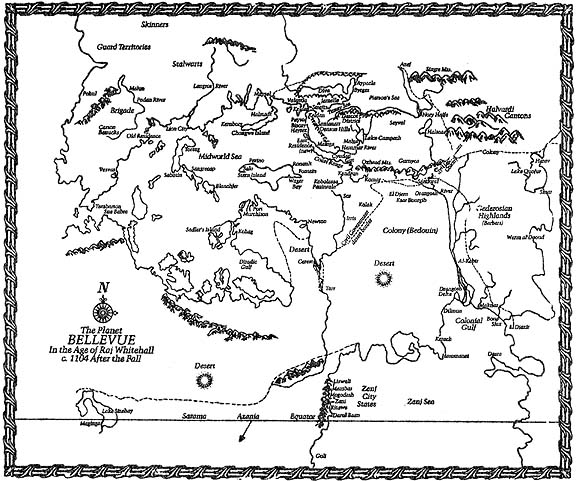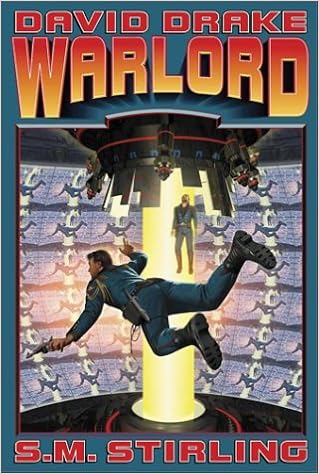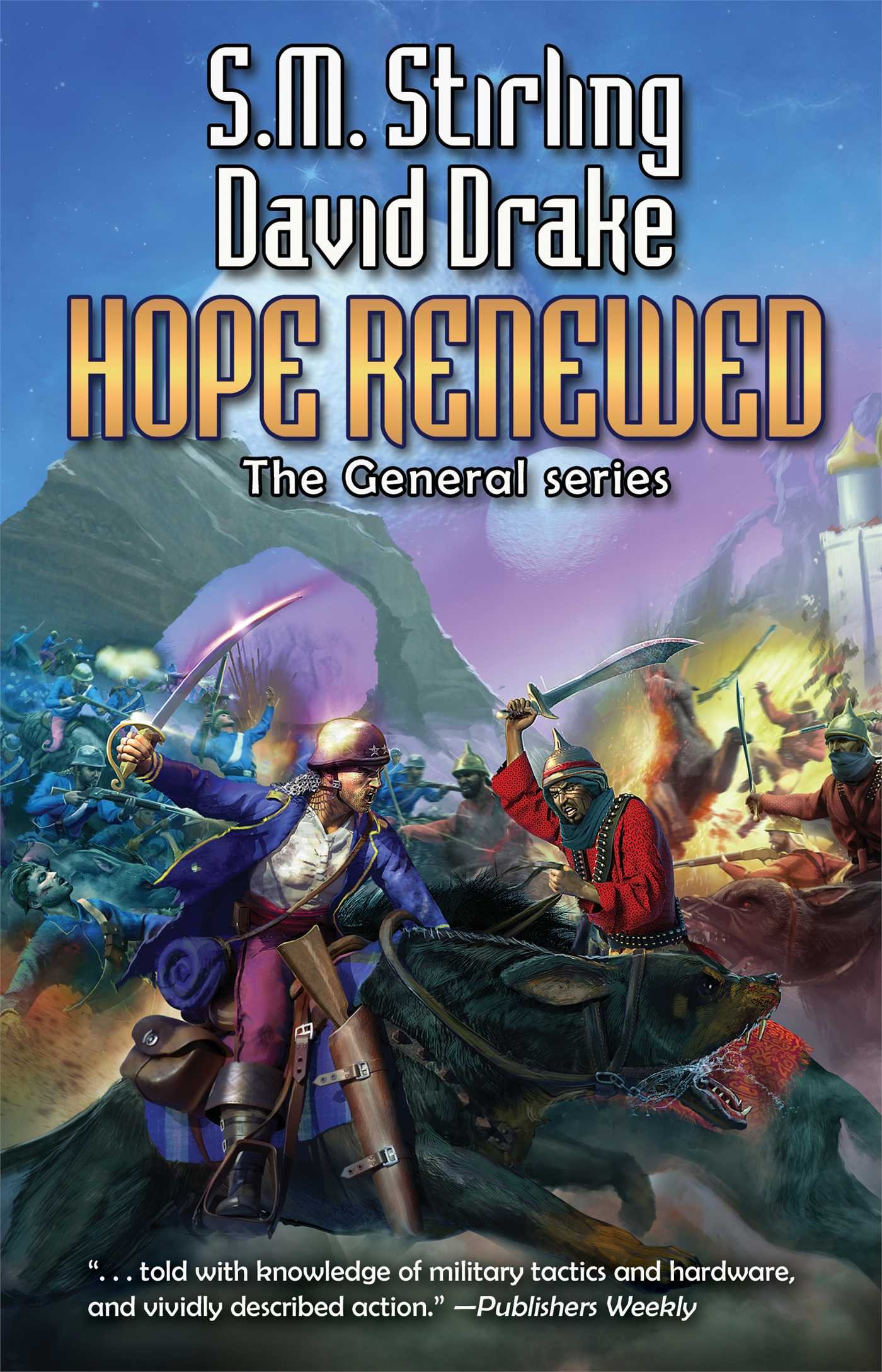The Forge - Chapter 1
- Location
- Busan Metropolitan City, Republic of Korea
Well, this is my first Let's Read thread, inspired by @The Victorian's Let's Read: David Weber's Honor Harrington. And I chose David Drake's The General series, mostly because the 8 out of 10 books of the series are free, and I have brought the last two books. And also because I really like the 'Days of Future Past' trope. In fact, this series inspired me to start my own Lost Colony worldbuilding containing a lot of references to this series, which I hope to create a story or quest with.
This Let's Read will focus on worldbuilding, the flaws in the story, and my own thoughts about both of them.
Two things I should mention before I start:
First, unlike other Let's Read narrators, I actually read most of the series, except Book 10.
Second, The General and its authors (Drake and S.M. Stirling) is not the most progressive or Leftward series aligned with SV's culture, so expect many problematic elements. Hopefully, this won't get me into trouble.
Now, let's begin with the first book, The Forge, available freely and legally through Baen, and if you don't want to go to that place (I don't, either), you can check the David Drake section of Free Speculative Fiction Online, which contains a collection of many sci-fi stories, both short and long.
I would start with the summary/description, but unfortunately, one in Amazon is pretty bare, so I'll do it myself.
This series does what many authors and stories do, transplanting parts of history from Earth into the SPACE! and retelling the events. In the case of the first five books of The General, it's Belisarius and his wars to reconquer the Western Roman Empire. The world resembles that of the Mediterranean of the 6th century as well, containing the expies of Roman, Ostrogoths, Vandals, Huns, and Sassanid Persia. Even their societies are inexplicably like their OTL equivalents, despite the 1800s tech level. David Drake adds a theme of sci-fi uplifting into this, rather typical for Baen stories.

This is the map of the known world, of planet Bellevue. You can see how it vaguely resembles the Mediterranean and the nearby regions. Unfortunately, most of the names are very hard to read, except that the 'current year' is set over a millennium after the apocalypse, and I can't find a bigger or more high res map, so it is fairly useless. The later regional maps, as well as the world maps from more recent books, are better.
Now, let's begin with the story.
Another character is introduced: Raj's friend, Thom Poplanich.
Curiously, they call their world 'Earth', as well.
Anyway, Raj and Thom are exploring the pre-apocalypse (the 'Fall') ruin under the capital. We learn that the dominant religion worships the pre-Fall civilization and that they consider computer a sacred relic, even an inactive one. Raj, being provincial, is more religious. Thom, a refined urban aristocrat, is more cynical, noting how corrupt the church is, citing their recent ruling on the 'Miraculous Multiplication' of relics. Apparently, the belief is what makes the relic holy, not the authenticity of the relic.
The tech-cult is basically the not-Medieval Christian Church, with fake relics, Inquisition, and all the lovely stuff.
They descend further down. Two languages are introduced: the Namerique and Sponglish, the former divided into Old and modern. Namerique is basically future English, the name presumably coming from 'North American'. Sponglish is one of those 'Hispanic USA' things, a creole of Spanish and English. We also learn that several military units had gone renegade during the Fall.
Then they find something interesting: a live equipment, still working after a thousand years. Raj is anxious, even comparing the feeling to his fighting during the not-Nika riot. Thom is more curious, however, and Raj reluctantly follows him.
Even deeper, Raj and Thom find more: many dried human bones, all somehow undisturbed. This is definitely a sign that they should just turn back and leave this place, but the door behind them closes down, trapping them here unless they can find another way out.
They also find an old service rifle, retired from the government service two centuries ago. And a rusty laser gun.
Speaking of the koorg-rifle, the retired service rifle, I have some thoughts. It is described as:
And octagonal barrels? It is also very unusual since only a very few guns have that kind of rifling. It gives the rifle greater accuracy, and reduce fouling from powder residues. It is also a way more expensive than simpler conventional rifling.
All these factors combined make the koorg-rifle unsuitable as a service rifle. Maybe a special weapon to equip skirmishers and sharpshooters, but not something you would want to give to every soldier.
Near the end of this chapter, Raj and Thom arrive on a circular room covered with mirrors, with a pillar of light on the center. This is depicted on the cover of Warlord, a collection of first two books, although they don't actually float in the books:

Then Raj notices the strangest thing: the mirrors, they don't reflect the light. At this, Thom finally decides that enough is enough and runs. Tried to run, that is. He suddenly freezes in place, everything about his body movement, including facial, just stops, like he is stuck in stasis (which he is, considering the nature of the setting).
Raj, being a military man, pulls his revolver and empties it into the room, but it does nothing except ricocheting and nearly killing both of them. He is put on stasis just as he was reloading, then an inhuman, emotionless voice speaks in his mind:
So ends the first chapter.
This Let's Read will focus on worldbuilding, the flaws in the story, and my own thoughts about both of them.
Two things I should mention before I start:
First, unlike other Let's Read narrators, I actually read most of the series, except Book 10.
Second, The General and its authors (Drake and S.M. Stirling) is not the most progressive or Leftward series aligned with SV's culture, so expect many problematic elements. Hopefully, this won't get me into trouble.
Now, let's begin with the first book, The Forge, available freely and legally through Baen, and if you don't want to go to that place (I don't, either), you can check the David Drake section of Free Speculative Fiction Online, which contains a collection of many sci-fi stories, both short and long.
I would start with the summary/description, but unfortunately, one in Amazon is pretty bare, so I'll do it myself.
This series does what many authors and stories do, transplanting parts of history from Earth into the SPACE! and retelling the events. In the case of the first five books of The General, it's Belisarius and his wars to reconquer the Western Roman Empire. The world resembles that of the Mediterranean of the 6th century as well, containing the expies of Roman, Ostrogoths, Vandals, Huns, and Sassanid Persia. Even their societies are inexplicably like their OTL equivalents, despite the 1800s tech level. David Drake adds a theme of sci-fi uplifting into this, rather typical for Baen stories.

This is the map of the known world, of planet Bellevue. You can see how it vaguely resembles the Mediterranean and the nearby regions. Unfortunately, most of the names are very hard to read, except that the 'current year' is set over a millennium after the apocalypse, and I can't find a bigger or more high res map, so it is fairly useless. The later regional maps, as well as the world maps from more recent books, are better.
Now, let's begin with the story.
We can infer several things from this. Firstly, our protagonist Raj Whitehall (Belisarius) is under the ground, in the catacomb of a place called East Residence. Secondly, he is not on Earth, but in some other place which has a native ecosystem in competition with imported Terran life. And the native ones appear to be dinosaurs.The rodent was dead now, dangling from the jaws of a cat-sized spersauroid, a slinky thing with a huge head and slender body carried high on four spidery legs. It blinked at them with eyelids that closed to a vertical slit, and then was gone with a rustle of scales against rubble. Raj grimaced. One of the few pleasant things about living in East Residence was that Terran life had mostly replaced the local. But not in the catacombs, it seemed.
Another character is introduced: Raj's friend, Thom Poplanich.
We learn that Raj's society has a hereditary aristocracy and that he is from a rural area.A genuine five-shot revolver, it was as much a badge of nobleman's rank as was the saber he carried slung over one shoulder. Both were as familiar as his clothes: Whitehall had been born in Descott County, hard country two weeks' journey north of the capital, where men went armed from puberty.
And also that he is not a Christian, and apparently part of some kind of tech-cult. New Residence is presumably the alternate name for East Residence, similar to how Constantinople was called 'New Rome' and 'The City' by the Romans, although it may also be one of several inconsistencies in this series (there are many, some of them can be very glaring)."Spirit of Man of the Stars," Raj said, and touched the silver wafer etched in holy circuits that hung around his neck. "This place makes my skin crawl." Everyone knew the catacombs under New Residence were ancient and huge . . . but those were just words until you saw it. This complex could house the whole population of the capital, with room to spare—and New Residence was the largest city on Earth.
Curiously, they call their world 'Earth', as well.
Anyway, Raj and Thom are exploring the pre-apocalypse (the 'Fall') ruin under the capital. We learn that the dominant religion worships the pre-Fall civilization and that they consider computer a sacred relic, even an inactive one. Raj, being provincial, is more religious. Thom, a refined urban aristocrat, is more cynical, noting how corrupt the church is, citing their recent ruling on the 'Miraculous Multiplication' of relics. Apparently, the belief is what makes the relic holy, not the authenticity of the relic.
The tech-cult is basically the not-Medieval Christian Church, with fake relics, Inquisition, and all the lovely stuff.
They descend further down. Two languages are introduced: the Namerique and Sponglish, the former divided into Old and modern. Namerique is basically future English, the name presumably coming from 'North American'. Sponglish is one of those 'Hispanic USA' things, a creole of Spanish and English. We also learn that several military units had gone renegade during the Fall.
Then they find something interesting: a live equipment, still working after a thousand years. Raj is anxious, even comparing the feeling to his fighting during the not-Nika riot. Thom is more curious, however, and Raj reluctantly follows him.
Even deeper, Raj and Thom find more: many dried human bones, all somehow undisturbed. This is definitely a sign that they should just turn back and leave this place, but the door behind them closes down, trapping them here unless they can find another way out.
They also find an old service rifle, retired from the government service two centuries ago. And a rusty laser gun.
Speaking of the koorg-rifle, the retired service rifle, I have some thoughts. It is described as:
That's certainly unusual for service rifles. Multi-barreled guns are popular for hunting, but in my knowledge, only the Austrians ever adopted such weapon as a service rifle, and even then only for their light infantry.
And octagonal barrels? It is also very unusual since only a very few guns have that kind of rifling. It gives the rifle greater accuracy, and reduce fouling from powder residues. It is also a way more expensive than simpler conventional rifling.
All these factors combined make the koorg-rifle unsuitable as a service rifle. Maybe a special weapon to equip skirmishers and sharpshooters, but not something you would want to give to every soldier.
Near the end of this chapter, Raj and Thom arrive on a circular room covered with mirrors, with a pillar of light on the center. This is depicted on the cover of Warlord, a collection of first two books, although they don't actually float in the books:

Then Raj notices the strangest thing: the mirrors, they don't reflect the light. At this, Thom finally decides that enough is enough and runs. Tried to run, that is. He suddenly freezes in place, everything about his body movement, including facial, just stops, like he is stuck in stasis (which he is, considering the nature of the setting).
Raj, being a military man, pulls his revolver and empties it into the room, but it does nothing except ricocheting and nearly killing both of them. He is put on stasis just as he was reloading, then an inhuman, emotionless voice speaks in his mind:
So ends the first chapter.

